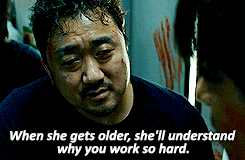My closest of friends have a pet peeve for the mainstream. They don’t root for songs so popular they can replace the national anthem, extremely trendy fashion fads, and “crush ng bayan” guys who bask in the limelight. They are not fans of cliches and generic wordings. That is why there is this hesitation for me to blog about something that everyone used to talk about. But if it is too good to be kept secret, then it would be worthwhile to be shared, right?
Light and funny movies that are a must-watch for the whole family can be blog material too, as I find out. But really, little did I know that in a super funny zombie movie such as Train to Busan I would find realizations that will resonate in days or even months — lessons marked so true in our lives today.
Here are a few:
While Train to Busan is generally a social commentary on what it truly means to be human, it can be seen as a tribute to all men who are ready to fight for the ones they love, even if it costs them their lives. This is crucial given the status quo where women are treated as sex objects and families are left to the sole leadership of mothers. The irresponsibility of many boys who refuse to grow up as men stain the reputation of those who aim hard to be good husbands and fathers. In the words of father-to-be Sang Hwa in the movie, “Dads always get the bad rap and none of the praise.”
This insight is further emphasized when placed side by side with the story of a man who also loves, but selfishly. It is easily irritating to watch how the selfish businessman Yong Suk puts everyone else in danger because of his personal agenda. Later on in the movie the audience realizes that his end desire is to be reunited with his mother. Nevertheless, getting to your goal while putting others in jeopardy ends in destruction.
Another truth exemplified: everyone can be a hero. Father-to-be Sang Hwa, Su An’s father, Seok Woo, and the crazy stranger who lived until near the end just to save Su An and the pregnant woman Sung Gyeong from a crowd of zombies. Men from different backgrounds, each one a hero. If men would just realize. A normal student. A boy next door. A simple engineer. An “ordinary” dad, or househusband perhaps. Just. Anyone. Can. Be. A. Hero.
One more learning that really struck me deep came hours after watching the movie, when I wondered who the real protagonists were — Suan and Sung Gyeong, or Seok Woo and San Hwa? If Suan and Sung Gyeong are the main characters, why is it that the sacrifices of both fathers resonate much longer? I heard it said that main characters are supposed to live until the end. But maybe the best way for them to embody the theme is to die. As San Hwa hinted near the climax of the movie, “It’s all about sacrifice.”





This truth is reflected in real life. We are who we now are because of someone else. We have what we’re having because of somebody giving way for us or helping us obtain it. It’s never a one-man team. Many times, we have what we have not because of our skills or efforts, but because someone else made a sacrifice for us. But oftentimes we act as selfish brats, claiming all of the rights and none of the responsibilities.
So while the end of the movie gave me a huge relief from a tireless attack of mad zombies, it forces me to rethink the word sacrifice. And I realize, sacrifices are oftentimes made out of necessity and not heroism. Then I think, How many people have sacrificed their time and resources for me? Who are those who have shed countless sacrifices out of love for me? And finally, how have I responded in return?
——–
“For you have been called for this purpose, since Christ also suffered for you, leaving you an example for you to follow in His steps,” — 1 Peter 2:21